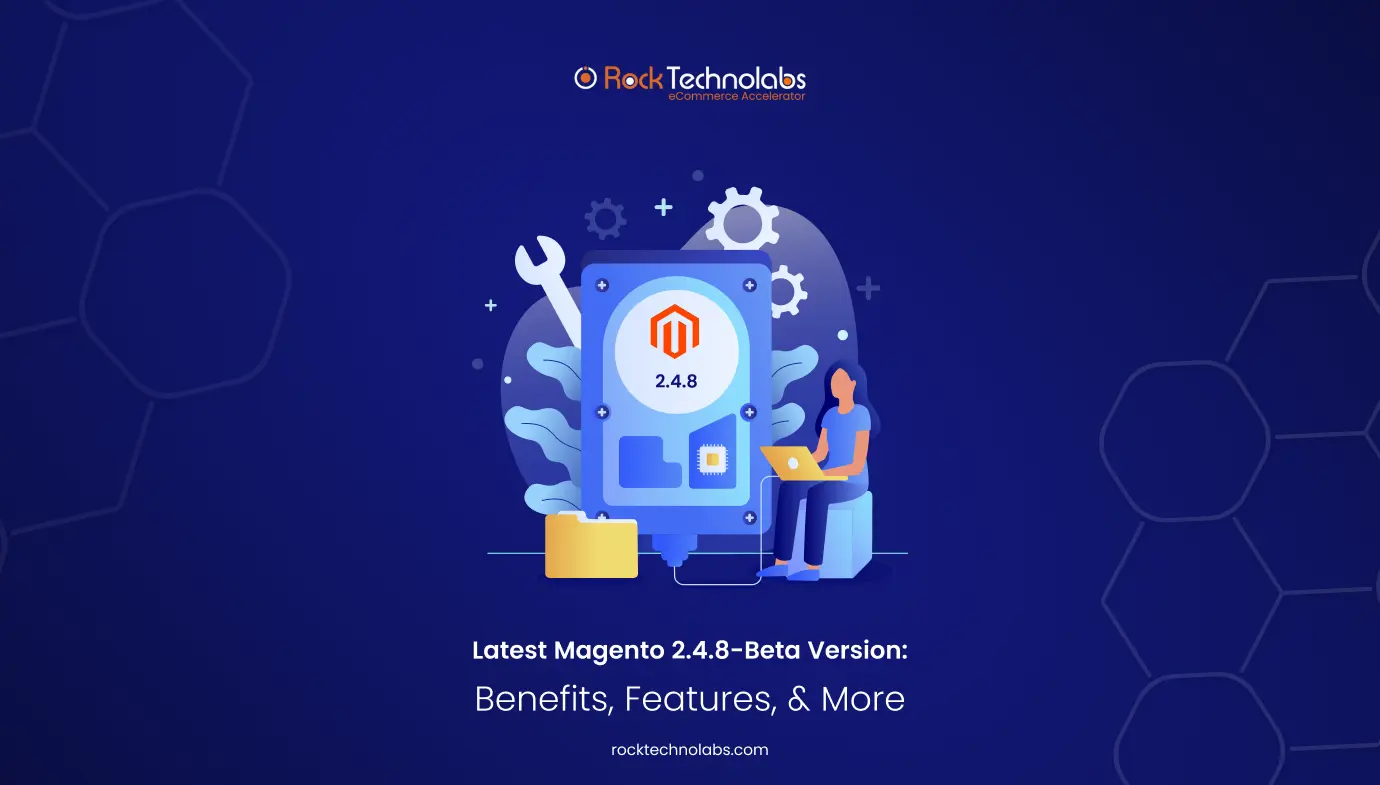Magento (Adobe Commerce) 2.4.8-beta: What’s New in the Magento Latest Version
 The Magento Open Source 2.4.8-beta release introduces a host of updates, ensuring better compatibility, performance, and security than what has been offered in Magento 2.4.7.
The Magento Open Source 2.4.8-beta release introduces a host of updates, ensuring better compatibility, performance, and security than what has been offered in Magento 2.4.7.
Below are the notable improvements made to the platform:
Framework Updates
Key dependencies, including league/flysystem and php-amqplib/php-amqplib, were upgraded to their latest version of Magento 2, ensuring enhanced compatibility and functionality.
PHPUnit has been updated to version 10, streamlining integration and WebAPI testing frameworks for improved test coverage.
Additionally, compatibility with MySQL 8.4 LTS and MariaDB 11.4 LTS was introduced across all Magento extensions and data migration tools, supporting seamless database performance.
Frontend Enhancements
Significant UI improvements in the Magento upgrade version include migrating from TinyMCE 5 to TinyMCE 7, addressing outdated functionalities and enhancing security.
The ExtJS folder was removed after migrating to the jsTree library, simplifying the codebase and improving maintainability. The Require.js library was updated to address security vulnerabilities, ensuring a robust and secure framework for frontend performance.
System Integrations and Optimization
Key libraries such as monolog/monolog and wikimedia/less.php were updated to their latest versions of Magento 2 to improve system performance and eliminate legacy issues.
The Elasticsearch 8 module has been deprecated, and administrators are informed via updated configuration notes, encouraging migration to better-supported alternatives.
Redis session management was enhanced to include retry support, ensuring consistent performance even under high loads.
Security and Performance Improvements
The Magento upgrade version 2.4.8-beta release focuses on addressing security vulnerabilities reported in earlier versions.
Notable fixes include upgrading dependencies like Require.js to its latest version and adding GraphQL API enhancements, improving both security and operational efficiency.
Developer Tools and Testing
Advanced compatibility with tools such as SVC, EAT, and UCT ensures seamless migration and testing on the latest database systems.
Default settings for indexers were updated to “Update by Schedule,” reducing the risk of system lag and data inconsistency.
These Magento updates collectively position Magento Open Source 2.4.8-beta as a more scalable, secure, and efficient eCommerce solution.
Enhanced Overview of Fixed Issues in Magento 2.4.8-beta Version
Magento upgrade version 2.4.8-beta brings significant improvements, with 253 resolved issues enhancing functionality, performance, and user experience.
Here’s a concise overview of the most notable fixes across key areas:
APIs Enhancements
- Infinite Loop Prevention: Resolved errors with the /V1/transactions REST API when handling transactions with identical parent and transaction IDs.
- GraphQL Query Stability: Fixed type errors in GetCustomSelectedOptionAttributes, ensuring smooth execution of queries involving integers.
- Product SKU Compatibility: REST API now supports product SKUs containing slashes (/) without errors, improving usability.
- Order Status Updates: Addressed restrictions on modifying order statuses via REST API.
Customer Account Improvements
- Input Validation: The latest Magento version has enhanced validation for name fields in customer forms, preventing code injection.
- Address Management: Fixed crashes during address addition or editing when the region field is hidden.
- UI Alignment: Corrected the alignment of action buttons in the admin panel for a polished appearance.
Admin UI & Workflow
- Product Import Reliability: Improved data validation for product imports with “Replace” behavior, minimizing risks of unintentional data loss.
- File Compatibility: Enabled product image uploads with capital letter extensions, streamlining workflows.
- Indexer Management: Addressed unused changelog tables and ensured appropriate behavior when switching indexer modes.
Checkout and Payment Fixes
- Multi-Country Shipping: Resolved errors when shipping to addresses in different countries during PayPal transactions.
- Coupon Code Tracking: Corrected the update of coupon usage statistics in multi-shipping orders.
- Cash on Delivery (COD): COD is now reliably available for allowed countries based on configuration.
Performance & Framework Stability
- Error-Free Updates: Fixed 500 server errors occurring during order creation with HTML minification enabled.
- Sitemap Precision: Restricted sitemap generation to include only assigned products and categories, enhancing SEO accuracy.
Braintree Payment Gateway Enhancements
- Local Payment Methods (LPM): Ensured proper rendering of LPMs even with mismatched billing and shipping addresses.
- Cross-Site Payment Vaulting: Resolved authorization errors when saving payment methods across multiple websites.
- Teardown Functionality: Prevented errors when navigating between shipping and payment pages in the checkout process.
Cart & Checkout Enhancements and Fixes
1. Exception Handling for Adding Products to Cart (AC-10660)
Issue: Adding products to the cart from the compare product page returned a JSON-encoded page instead of a proper error message.
Fix: Exceptions are now properly handled, displaying a message manager notification in the controller.
2. GTAG Transaction Data Tracking (AC-10698)
Issue: Incorrectly sent transaction prices and totals for Google Tag (GTag).
Fix: Now correctly sends transaction prices and totals for individual orders, improving eCommerce tracking accuracy.
3. Failed Payment Email Template Update (AC-11641)
Issue: Shipping details were included in failed payment emails for virtual products.
Fix: Emails now exclude shipping address and method for virtual products, ensuring relevance.
4. Sales Rule Validation Regression (AC-11876)
Issue: Coupons could be applied even when product conditions didn’t match.
Fix: Validation ensures sales rules only apply when product conditions match.
5. Shipping Methods Loader Block Issue (AC-11993)
Issue: Loader blocked shipping methods after a postcode change.
Fix: Custom shipping methods now function correctly without rate validation rules.
Cart & Checkout Improvements
1. Email Field Rendering in Checkout (AC-9386)
- Issue: Email field was missing or took a long time to render on checkout shipping and payment pages.
- Fix: Email field now renders reliably and promptly.
2. Datepicker for Customizable Options (ACP2E-3097)
- Issue: Date picker worked only for the first date field in admin order creation for products with multiple date options.
- Fix: Date picker now displays for all date fields.
3. Instant Purchase Shipping Fix for Configurable Products (AC-12119)
- Issue: Instant Purchase incorrectly selected the more expensive shipping method.
- Fix: Ensures the cheapest shipping method is chosen.
Catalog Enhancements
1. Data Comparison Accuracy for Numeric Fields (ACP2E-2949)
- Issue: Save functions were unnecessarily triggered for unchanged numeric fields.
- Fix: Save is now triggered only when data changes, with strict type matching for numeric fields.
2. GraphQL Category Filters (ACP2E-3090)
- Issue: Filters fetched all categories instead of direct child categories.
- Fix: Only direct child categories are fetched when filtering by category_uid.
3. GraphQL Product Sorting Fix (ACP2E-3166)
- Issue: Sorting products by multiple fields via GraphQL variables did not work.
- Fix: Sorting by multiple fields now functions correctly.
4. Special Price Bulk Update API (ACP2E-2672)
- Issue: Errors in Magento commerce occurred when updating large numbers of products with the Special Price API.
- Fix: Single campaigns are created for each date range, supporting faster processing of concurrent requests.
5. Product Category Tree Order (AC-7050)
- Issue: Category tree in product editing did not match the display order in Catalog->Categories.
- Fix: Category tree now matches the defined display order.
Cloud Enhancements
1. Session ID Stability for POST Requests (ACP2E-3010)
- Issue: PHPSESSID changed on each POST request for logged-in customers when L2 Redis cache was enabled.
- Fix: PHPSESSID remains stable for logged-in customers, ensuring session continuity.
Payments Fixes
1. Payflow Fetch Button Issue (ACP2E-2841)
- Issue: Fetching transactions created a new payment transaction for orders already paid.
- Fix: Transactions are now fetched without duplicating payment records.
2. PayLater Message for Canadian PayPal Merchants (ACP2E-3028)
- Issue: PayLater message was not displayed for Canadian merchants on PDP.
- Fix: Ensures PayLater messages appear correctly based on buyer location.
Promotions Enhancements
1. Customer Attributes in Account Creation (ACP2E-2602)
- Issue: Customer attributes were not visible during account creation via invitation.
- Fix: Attributes are now accessible during the account creation process.
2. Coupon Code Reusability for Failed Payments (ACP2E-2627)
- Issue: Coupon codes with a “Uses per Coupon” limit were not released for reuse after failed payments.
- Fix: Coupon usages are updated immediately, preventing errors and enabling reuse.
3. Catalog Rule Product Indexer SQL Errors (ACP2E-2811)
- Issue: Reindexing caused SQL errors due to incorrect batch sizes in large catalogs.
- Fix: Proper handling of custom batchCount values prevents SQL errors.
SEO Enhancements
- URL Rewrites with Accents (AC-11907)
- Issue: Adding URL rewrites with accents caused infinite loading.
- Fix: URL rewrites with accents now work without errors.
- Multi-Store Category URL Rewrites (ACP2E-2641)
- Issue: Wrong URL rewrites were generated for third-level categories in multi-store setups.
- Fix: Correct URL rewrites are now generated for child categories.
- Special Characters in Product Names (ACP2E-2770)
- Issue: Double-byte characters in product names blocked product creation.
- Fix: A new setting allows applying transliteration to product URLs to prevent errors.
Test Framework Fixes
- Skipped Integration Tests (AC-11491)
- Fix: Previously skipped integration tests have been re-enabled to improve test coverage.
- JSON Column Type Errors (AC-11654)
- Issue: Integration tests failed due to JSON column types being misidentified as LONGTEXT in MariaDB.
- Fix: Correct identification of JSON column types during schema validation.
Why To Stay Updated with the Latest Magento Version
- Enhanced Security: Each update includes essential security patches to protect your store and secure transactions.
- Improved Performance: New releases optimize performance, ensuring a seamless user experience.
- Tool Compatibility: Keeps your platform compatible with third-party libraries and extensions for added functionality.
- Official Support: Older versions may lose priority Magento support, while the latest versions ensure prompt assistance.
- Scalability: Updates enhance the platform’s ability to handle increased traffic and business growth.
- Uninterrupted Operations: Staying updated minimizes risks of bugs and disruptions, ensuring smooth operations.
A Brief History of Magento
- 2001-2007: Magento originated from Varien Inc., founded by Roy Rubin in Los Angeles. Initially, Varien customized osCommerce for clients but later developed Magento as a scalable, feature-rich open-source platform. The first beta version launched on August 31, 2007.
- 2008-2010: Within 7 months, Magento Community Edition (CE) became available as a free, customizable platform. In 2009, Bob Schwartz became the president of Varien and then by 2010, rebranded Varien as Magento, besides this eBay invested in Magento, and acquired a major stake in it.
- 2011-2015: In 2011 when eBay acquired Magento, they saw rapid growth, and then in 2015 launched Magento 2. Besides this, Magento became independent under Permira’s ownership and was separated from eBay.
- 2016-2018: In the year 2016, Magento 2 which we called earlier Enterprise Edition (EE) targeted larger e-commerce businesses. And in 2017, Magento was renamed Magento Open Source (formerly Magento Community) and Magento Commerce (formerly Magento Enterprise). In 2018, Adobe acquired Magento for $1.68 billion, integrating it into Adobe Experience Cloud.
- 2019-2024: Adobe merged Magento Commerce Cloud into Adobe Experience Cloud. Moreover, major updates like Magento 2.4.6 and version 2.4.7-beta highlighted its evolution with different fixation to upgrade its performance. And now as you are reading this blog, on the 8th Oct. Magento 2.4.8-beta was launched.
Frequently Asked Questions (FAQs)
What’s the difference between the beta and official Magento release?
A “beta” Magento release is an early version of the software. It is launched for developers and merchants to let them test new features/functionalities including the compatibility with different extensions so that they can provide feedback before the final release.
In contrast to the beta Magento version, the “official” Magento release is a fully tested, stable version ready for live use, with fewer bugs and issues than the beta.
The beta phase helps improve the software before its official launch.
What factors should be considered before updating to the latest Magento version?
Before updating to the latest Magento version, several factors must be considered. Ensure that third-party services, including hosting providers and CDNs, are compatible with the update.
Upgrade only if the new version offers essential features, as the process demands time and effort.
Always backup your files and databases to secure your data before initiating the upgrade.
Review the release notes to understand new features, fixes, and potential issues.
Lastly, check the compatibility of your store’s extensions to ensure they function properly with the updated version.
Recommended Read: How to Upgrade Your Current Version with Magento 2 Latest Version
How can I find out which version of Magento I’m using?
Method 1. Using a Web Browser
Step 1. Add `/magento_version` to your site’s URL (e.g., `www.yourwebsite.com/magento_version`).
Step 2. Press Enter to view your Magento version.
Method 2. Using the Command Line
Step 1. Open the command prompt and navigate to your Magento installation directory with the `cd` command.
Step 2. Type: `php bin/magento –version` to display the version.
Update to Magento Latest Version with Rock Technolabs!
We tried our best through this blog to give you all the details of Magento Open Source 2.4.8-beta, which stands as a milestone with the security, performance, compatibility, and usability it is offering to e-commerce merchants.
Moreover, more criteria are fixed by the Magento community that you can check on the official site of Adobe in the official version release notes section.
Furthermore, updating to Magento 2.4.8-beta ensures your store remains secure, scalable, and ready to deliver exceptional user experiences with over 250 resolved issues and substantial updates.
Ready to elevate your store to the latest magento 2 version?
Contact the Rock Technolabs team today for Magento upgrade services.








